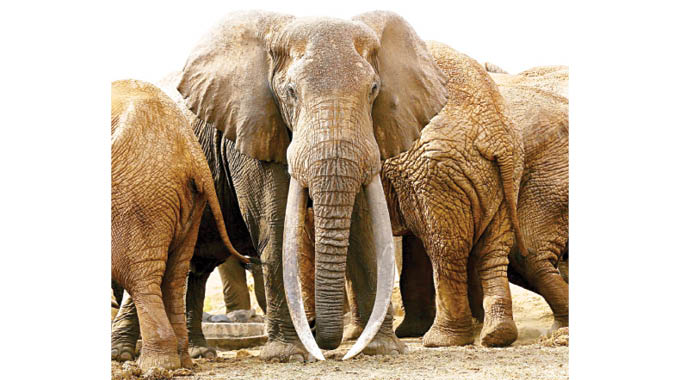Covid-19 plunges Zimbabwe into wildlife management crisis

Emmanuel Koro
The Covid-19 pandemic has led to an almost three-month ban on international and domestic travel to Zimbabwe’s prime tourist resorts. This has plunged the country into a wildlife management crisis characterised by a drying up of funds to pay the countries’ rangers and other conservation expenses.
Tourism and trade in wildlife — including hunting — provide the major sources of revenue for the management of wildlife in Zimbabwe. With the ban on international ivory and rhino horn trade still in force, Zimbabwe has been left with only hunting and tourist visits to fund wildlife management. Sadly, the advent of the Coronavirus necessitated a lockdown on all economic activities with almost no income to pay its rangers or to protect its wildlife from increased poaching.
“The situation is bad and very soon we won’t have enough money on hand to pay our rangers,” said Zimbabwe Parks and Wildlife Management Authority spokesperson, Tinashe Farawo last week. This sounded like both an appeal to the country’s leadership and to the world to do something quickly in order to rescue the Southern African country’s abundant wildlife from multiple threats.
Although the Zimbabwean authorities lifted the ban on visiting the country’s tourist destinations soon after this appeal, cash-strapped Zimbabweans are less likely to visit the country’s best tourist attractions in sufficient numbers to bring the desired income to pay the rangers. Only the now long-awaited return of international tourists can bring the desired income to the level required. Until then, the country needs funds to be generated from some other sources.
Speaking at the June 2019 Africa Wildlife Economy Summit in Victoria Falls, President Emmerson Mnangagwa appealed to the world to allow Zimbabwe to trade in its huge quantities of stockpiled ivory valued at US$600 million. He said that if trade in the ivory were allowed, it could pay for the country’s wildlife management for the next 20 years.
As is typical of such pleas from Southern African countries, the appeal fell on deaf ears including those of CITES Secretary General Ivonne Higuerro as well as European Union, World Bank and USAID representatives.
According to Godfrey Harris, a Los Angeles-based former U.S. diplomat and member of US President Lyndon Johnson’s Executive Office, most Western interests seem to prefer giving aid rather than allowing trade.
“Aid can be doled out year by year to keep the African countries dependent on these annual funds and beholden to the Western organisations and countries providing it. This gives them continuing power to control Africa’s wildlife, just as their predecessors did in colonial times. It is hard to escape the thought that racism continues to be deeply entwined in the perpetuation of this 19th century attitude.”
Zimbabwe, along with other SADC countries suffering from elephant over-population, protested the CITES international ivory trade ban in November 2019. The Geneva-based CITES Secretariat accepted the Sadc countries’ protest reservations on restrictive trade decisions on the elephant, rhino and giraffe taken by the Conference of the Parties in Geneva in August 2019.
This means that if markets could be identified or re-opened, Zimbabwe could sell its ivory and generate income to look after its wildlife. With China, Japan, USA, Vietnam, Laos and other lucrative ivory markets having been shut down, however, the challenge is to identify the markets that might want to trade in Zimbabwe’s ivory.
“I have assigned a team to urgently work on a strategy to put pressure for a case to sell our ivory,” said Minister of Environment, Tourism and Hospitality Industry, Mr Nqobizita Mangaliso Ndlovu.
Environment Portfolio Committee chairperson Concilia Chinanzwavana (MDC-Alliance) said, “Yes, the once — off [ivory] auction would definitely help to alleviate the financial deficit in wildlife conservation by supporting further recruitment and remuneration of rangers.”
She also welcomed the establishment of the proposed Sadc Regional Commission For Ivory and Rhino Horn Trade, to raise wildlife conservation funds through international trade in ivory and rhino horn, on condition that it is governed by the “financial laws that dissuade abusive handling.”
Elephant management specialist and former Deputy Director of Zimbabwe National Parks and the strategist for the establishment a Sadc ivory and rhino trading market, Rowan Martin recently said that Zimbabwe and other Sadc countries should immediately come together to create the mechanism to establish an ivory and rhino auction market.
“The market should be established in Johannesburg because of its international financial sophistication and perhaps built on the model of the London gold market,” said Harris.
Chinanzwavana thinks that one of the long-term goals towards re-opening sustainable international trade in ivory “is to ask China to re-open its ivory markets to the products of Africa’s wildlife.”
Notably, the skin of African elephants is also on high demand in some countries as well. It was for trade reasons and before the Covid-19 diplomatic fall-out with the USA, that China was persuaded to shut down its ivory market. Nevertheless, the fact that East Asian countries are still consuming ivory products in substantial quantities suggests a continuing and sustainable demand as evidenced by ongoing illegal ivory seizures in that part of the world.
A Hwange elephant attack survivor, Biggie Shock, who is living in fear of a second attack as big elephants herds are increasingly visiting his village in search of food and water said, “If rangers lose their jobs there is a real danger that under these circumstances they can assist poachers and in turn to get paid money to look after their families.”
The Sadc countries’ wildlife is seemingly facing a bleak future. In Botswana elephants are dying in large numbers. From March 2020 to date, over 300 elephants have died of what is widely believed to be overpopulation and inadequate food resources, according to many scientists worldwide. Poaching has been ruled out. The Government of Botswana is still awaiting test results to determine the cause of the mass elephant deaths.
“It is an unnecessary cruelty,” said Harris. “These elephant deaths rest on the consciences of the animal rights groups and their supporters who have lobbied relentlessly to prevent culling to levels that can be supported by the elephant habitats. Interference in local wildlife management decisions is just another manifestation of their racist attitude toward Africa.”
Emmanuel Koro is a Johannesburg-based international award-winning environmental journalist with 27 years experience in environment and development reporting.












Comments